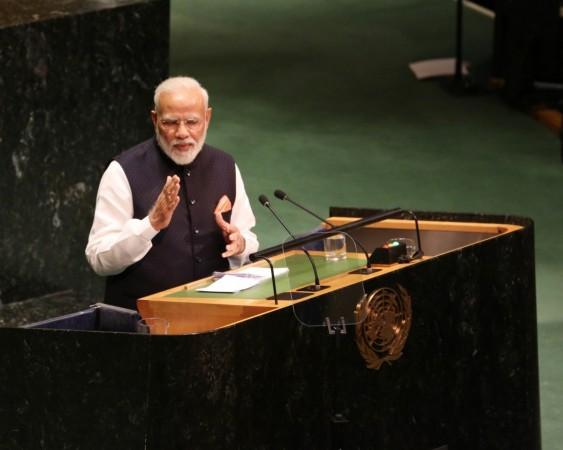
India presented before the world its rapid strides towards bringing development to its 1.3 billion people -- from toilets in every home, potable water in every tap, building rural roads, bank accounts for every citizen to health insurance and housing for its people -- and said that it was ready to share its experience with other developing countries, as Prime Minister Narendra Modi addressed the 74th UN General Assembly here on Friday.
The Prime Minister emphasised before the world that he had been voted back to power by an overwhelming mandate in which 600 million people had voted, the largest such election anywhere in the world, to stress the massive mandate he had got, thus conveying to the world that his every move had the backing of the people.
Modi detailed the development works his government has brought about since 2014, when he was first voted to power, -- from Swachh Bharat, building 11 crore toilets, free healthcare for 50 crore people, the Jan Dhan Yojana for linking people to bank accounts, Digital India, to bringing potable water to the people -- to tell the world about the inclusiveness of his governance.
Though he did not mention Kashmir in his speech, the import of his address was clear -- that his every move was aimed to bring governance to every citizen, something that Jammu and Kashmir was deprived of due to Article 370. The Prime Minister emphasised that he had got people's overwhelming mandate to go forward.
"At a time when the entire world is celebrating the 150th birth anniversary of Mahatma Gandhi, the world's biggest elections took place with 600 million people, the most number of people in the world, voting for me and my government. And due to that I am again here in fornt of you. But the message behind this victory is more significant," Modi said, as he outlined the development and welfare programmes his government has been pushing.
He said that Digital India has helped establish peoples' rights and remove corruption, saving to the tune of $20 billion, which is "a message of hope for the world."
Modi said that India has decided to rid itself of single-use plastic in the next five years and bring potable water to 15 crore households, besides building roads in the far-flung villages.

By 2022, when the country celebrates 75 years of its Independence, India would build two crore more houses, he said, adding that by 2025, India would rid itself of tuberculosis.
Modi said that all the work is being done through peoples' participation -- "jan bhagidari se jan kalyan".
"And this is not just for India, but for the world -- 'Jan Kalyan se Jag Kalyan'," he said, outlining India's vision of its leadership role for developing countries.
"The progress is for everyone," he said, adding that in his interactions with other developing countries, he had heard how they faced challenges in the path of their development.
"When I listen to their problems and get to learn from them, my resolve gets strengthened. As I go forward to bring about development for my country, it should be able to help other countries as well," he said.
Highlighting India's message of inclusiveness, Modi quoted Tamil poet Kaniyan Pungundranar of 3,000 years ago and said, "We belong to all places and we belong to everyone."
"The sense of belonging beyond borders is unique to India," he said.
On the issue of climate change facing the world, Modi said India has raised its target for renewable energy to 450 GW, as he invited other countries to join the global disaster infrastructure fund.
Highlighting India's participation in bringing peace to the world, he said that in UN peacekeeping missions, India has made the biggest sacrifice.
He then briefly, but effectively, touched on the issue of terrorism -- obliquely targeting Pakistan.
Modi said that India has given the world the message of peace, "Buddhaa", and not war, "yuddh", and that is why its voice carries seriousness when it alerts the world against terrorism, and anger too -- in a reference to the terrorism wrought in India by Pakistan-backed elements.
The Prime Minister also said that a "world divided on the issue of terror" harms the very principles on which the UN was created.
He called for the world to unite against terror for the sake of humanity.
Modi said: "India has given the world not war (yuddh) but Buddha or peace, the message of peace. And that is why we have the seriousness when we raise our voice against terror, and anger too," changing the decibel of his tone to emphasise the point.
"We agree that terrorism is not just a challenge for one country, but for the entire world... It's the biggest challenge for humanity.
"A world divided on the issue of terror harms those very principles on which the UN was created. For the sake of humanity, the world must unite and come together against terrorism," he said.
Modi also called for new focus on multilateralism, and on the UN, saying that in view of the changes that are happening around the globe, "a disunited world is not in anyone's benefit".
He said that countries cannot afford to remain within their borders any longer.
"And in this, we have to give new focus to multilateralism, and to the UN," he said.
The Prime Minister then cited Swami Vivekananda's famous speech on religious harmony delivered in Chicago in 1893.
"India gives the same message of harmony and peace, and not dissension," he said.

















